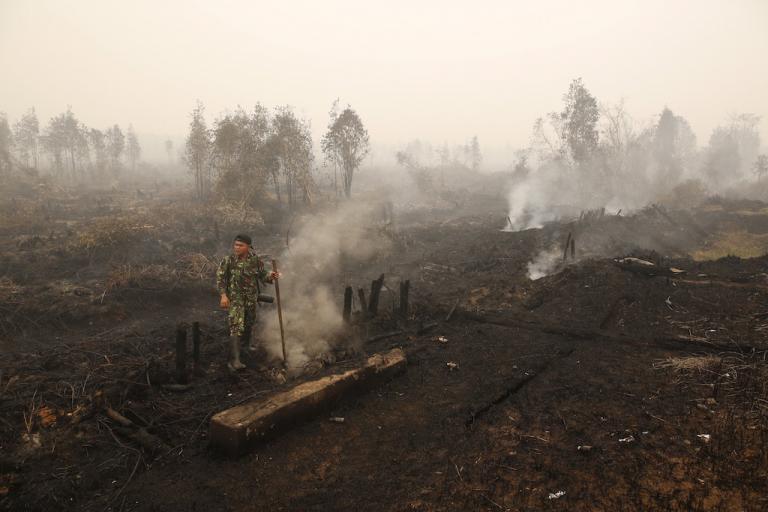To slow climate change, you have to start here
An Indonesian soldier checks on a peat land fire near Palangkaraya, Central Kalimantan, Oct. 28, 2015.
The phrase “climate change” often summons images of exhaust-spewing trucks and coal plants blackening the skies.
But there’s a lesser-known source of emissions that the public should fear alongside traffic jams and filthy factories. And if this top polluter isn’t reined in, humanity’s efforts to ward off climate change disaster — exemplified by the recent 196-country United Nations agreement in Paris — could be doomed.
That threat? Annual infernos driven by slash-and-burn farming that sweep through Indonesia’s jungles and choke much of Southeast Asia in a toxic haze. This year’s blazes were the worst in at least 15 years, destroying thousands of acres of forest and emptying an estimated 1.75 billion metric tons of greenhouse gas emissions into the earth's atmosphere.
For those who live the region, there is much to despise about these fires. They spew out smoke that sickens half a million people. They drown villages in a lung-searing haze. They force city dwellers from Kuala Lumpur to Singapore to hunker down indoors.
But even people who’ll never visit the region should fear Indonesia’s flaming jungles. When the forest fires rage hardest, they can spew out more emissions per day than the entire US economy, according to the pro-conservation World Resources Institute.
The fires briefly turned Indonesia — a largely impoverished, Muslim-majority archipelago — into the world’s worst polluter. During particularly smoky spells in September in October, Indonesia daily churned out more greenhouse gases than even China or the US.
When Indonesia’s fires are tamed, the country is usually pegged as the sixth-worst offender, behind China, the United States, the European Union countries (which are counted as one bloc), India and Russia.
More from GlobalPost: What the Paris climate deal means for Africa
Indonesia’s official climatology agency has called the man-made fires a “crime against humanity of extraordinary proportions.” A leading analyst of the fire crisis — Erik Meijaard, an Indonesia-based conservation scientist — terms them “probably the biggest global environmental crime of the 21st century.”
But short of a miracle, the world can expect to watch Indonesia burn next year — and belch out a sickening amount of planet-warming gases once more.
There are no easy solutions to keep Indonesia’s jungles unlit. Some forest fires are started to clear land for massive agro-conglomerates that produce palm oil, a substance readily found in American supermarkets. It’s used to make everything from cookies to shampoo to packaged bread.
But fires are also started by poor farmers, hunters and others. The “underlying problem of Indonesia’s many million arsonists,” Meijaard says, should be confronted by cops and soldiers threatening legal action against anyone who illicitly lights up the jungle.
That would require an unprecedented burst of competency from Indonesia’s rural police, who are typically disorganized.
The fires, which flare up in the latter half of the year, have currently subsided. It’s unclear whether Indonesia can use the coming months to turn its underpaid law enforcers into a frontline squadron hunting down illegal fire starters.
But the country is making big promises nonetheless. At the UN climate change summit in Paris, Indonesia vowed that it would somehow cut its emissions 29 percent by the year 2030.
Though offering few specifics, Indonesian President Joko Widodo acknowledged at the summit that the country’s jungles are “acting as the lung of the world” and insisted his government is “developing Indonesia in a way that is giving due attention to the environment.”
This story was cross-posted by our colleagues at Global Post.
Our coverage reaches millions each week, but only a small fraction of listeners contribute to sustain our program. We still need 224 more people to donate $100 or $10/monthly to unlock our $67,000 match. Will you help us get there today?
